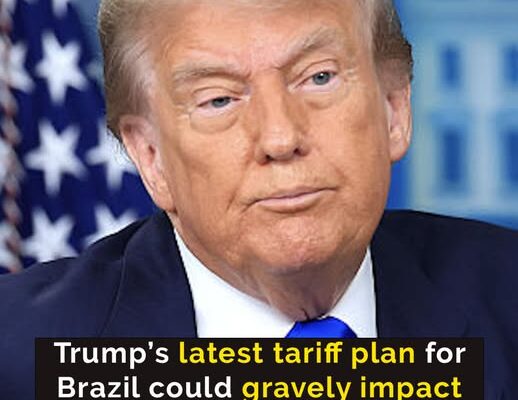In a bold and contentious move, former U.S. President Donald Trump has announced steep tariffs of up to 50% on Brazilian imports — a decision he openly admits is “in part” retaliation for what he calls a “witch hunt” against Brazil’s former leader, Jair Bolsonaro. This economic blow could soon ripple through American mornings, hitting coffee lovers where it hurts most: their cup of joe.
Political Firestorm Ignites Between Washington and Brasília
On July 9, Trump unleashed a scathing statement that sent shockwaves through Brazil, sharply escalating tensions between the two countries. His justification? Brazil’s “insidious attacks” on U.S. tech firms and what he labels a politically motivated prosecution of Bolsonaro — Trump’s close ally — accused of attempting to overturn Brazil’s 2022 election results.
The backdrop to this bitter feud is the chilling January 8, 2023, riots in Brasília, where Bolsonaro supporters violently stormed key government buildings — eerily reminiscent of the January 6 Capitol insurrection in the United States. Bolsonaro denies any involvement, echoing Trump’s own denials regarding the U.S. unrest.
“This Trial should not be taking place. It is a Witch Hunt that should end IMMEDIATELY!” Trump declared on Truth Social, denouncing Brazil’s current government as “an international disgrace” and insisting the tariffs are needed to “rectify the grave injustices” inflicted upon Bolsonaro.
Brazil Strikes Back
Brazil’s President Luiz Inácio Lula da Silva wasted no time firing back. On the same day, he tweeted: “Brazil is a sovereign nation with independent institutions and will not accept any form of tutelage.” Lula emphasized that the judicial proceedings are strictly under Brazil’s jurisdiction, underscoring that “freedom of expression must not be confused with aggression or violent practices,” directly challenging Trump’s defense of Bolsonaro’s supporters.
Adding to the chorus, Brazilian Minister Gleisi Hoffmann criticized the tariffs as relics of a bygone era. “The time when Brazil was subservient to the US was the time of Bolsonaro,” she said. “The US president should take care of his own problems and respect Brazil’s sovereignty and judiciary,” she told the BBC.
Coffee Prices Percolate Higher Amid Tariff Threats
While political leaders spar, coffee lovers are already feeling the pinch. Brazilian coffee prices, especially Arabica beans, have been climbing sharply—following a staggering 70% spike last year driven by tight global supply.
In the days before the tariff announcement, futures for Arabica coffee jumped another 1.3%, stoking fears that the hefty tariffs could freeze Brazilian coffee shipments to the U.S. market.
Michael Nugent, a senior coffee broker and consultant, warned Reuters: “A tariff of this size would all but shut down that flow. Brazilian exporters won’t absorb it. U.S. roasters can’t.” Nugent predicts Brazil will simply redirect its coffee to other markets, while the U.S. will scramble for alternatives—turning to Colombia, Honduras, Peru, or Vietnam—but not at the same volume or price.
A Brewing Shift in Global Coffee Trade
As the world’s largest coffee producer, Brazil supplies nearly one-third of America’s coffee needs. With nearly 200 million Americans drinking coffee daily, the stakes are high. In 2024 alone, the U.S. imported over 8 million 60-kg bags of Brazilian coffee—representing 33% of total U.S. coffee consumption.
For now, Brazilian coffee lovers and American consumers alike watch anxiously as the political and economic storm brews, wondering just how bitter the next cup of coffee might taste.
“Countries keep buying more from Brazil because it offers far better value compared to pricier alternatives,” a trading house director told Reuters.
“But the real question now is not whether Brazil will sell, but whether the U.S. will buy—given these steep tariffs. Probably not,” he added.
The Impact Goes Beyond Coffee
And the tariff shockwaves don’t stop with coffee.
The U.S. has become increasingly dependent on imports as domestic citrus production struggles with devastating crop diseases, hurricanes, and freezing weather. Today, over half of the orange juice consumed in America comes from Brazil—meaning breakfast tables nationwide could soon face not just higher prices, but also shortages.
These tariffs aren’t just political posturing—they’re poised to directly affect consumers’ daily routines, starting with what’s in their morning cup and glass.
What Do You Think?
How will these tariffs on coffee and orange juice impact your mornings? Will you change your routine, or will you simply absorb the higher costs?
We want to hear from you! Share your thoughts and spread this story to get the conversation brewing.
